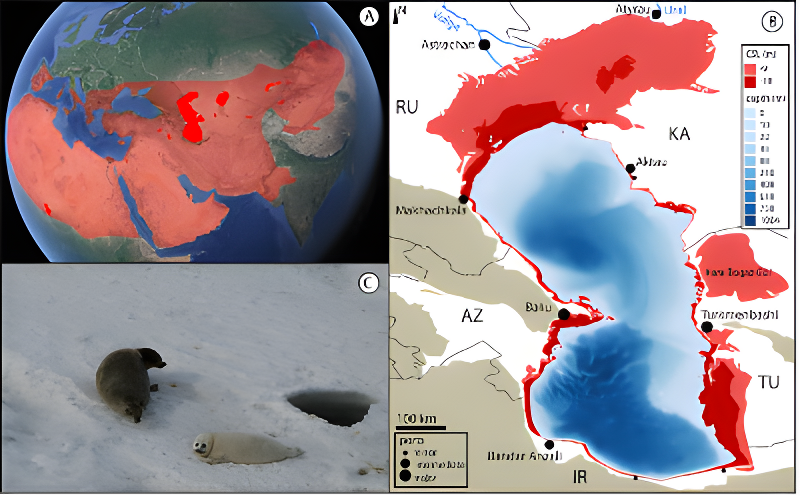Azerbaijan sounds alarm over Caspian Sea crisis, calls for urgent regional action

Azerbaijan has issued a serious warning on the deteriorating state of the Caspian Sea and the Kura River, urging neighboring countries to unite in a coordinated and immediate effort to prevent a regional ecological disaster. Speaking at the Astana International Forum (AIF2025), Mukhtar Babayev, Azerbaijan's presidential envoy for climate issues, emphasized that the Caspian must not become another environmental tragedy like Iran’s Lake Urmia or the Aral Sea in Central Asia.
Babayev revealed that Azerbaijan has initiated a high-level summit dedicated to addressing the sharp and accelerating decline in Caspian Sea water levels. “We have invited all Caspian littoral states to engage in consultations and open dialogue on this critical issue,” he said, adding that government bodies from these countries are actively working on defining the summit’s scope and timeline. The date and agenda will be announced in the coming weeks.
While Babayev's statement echoed Azerbaijan’s leading diplomatic initiative, the broader water crisis stems from a complex mix of climate change, declining river inflows, and inadequate interstate coordination—particularly concerning the Kura River, Azerbaijan’s primary freshwater source. Flowing for 1,515 kilometers, the Kura originates in Turkey and travels through Armenia and Georgia before reaching Azerbaijan. Along the way, various reservoirs, mismanagement, and pollution have severely reduced the river's flow by the time it reaches Azerbaijani territory.
The situation is exacerbated by the fact that Armenia has refused to sign binding interstate water agreements and has been accused of polluting the river and allowing unchecked water loss. Meanwhile, Georgia's upstream usage has also contributed to dwindling water levels. This has directly impacted Azerbaijan's ability to maintain water security and preserve the balance of the Caspian Sea, which receives its inflow from several rivers, including the Volga and Kura.
The Caspian Sea, the world’s largest enclosed inland body of water, has witnessed a consistent decline in its water levels since the mid-1990s. In 2021, a drop of 35 centimeters was recorded, followed by another 20–25 centimeters in 2022 alone. Experts attribute this alarming trend to rising temperatures and shifting climate patterns. Cyclonic precipitation that once fed the Volga basin has shifted further north toward Moscow and St. Petersburg, now flowing into the Arctic Ocean instead of the Caspian. This change has drastically reduced freshwater input into the sea.
An additional factor contributing to the Caspian’s shrinking is the Kara-Bogaz-Gol bay in Turkmenistan, which continues to siphon off large volumes of water from the Caspian only for it to evaporate rapidly. As a closed system with no natural outlet to the world’s oceans, the Caspian cannot replenish lost water through oceanic tides or inflows, making evaporation a critical threat.
In Azerbaijan itself, efforts to manage and store water more efficiently have included the construction of 140 large and small reservoirs with a combined volume of nearly 22 billion cubic meters. The Mingachevir Reservoir alone holds 16 billion cubic meters. While these measures aim to support future water needs, they are insufficient without broader regional coordination and reform in transboundary water use.
The drying up of the Kura River is causing not only a shortage of water for agriculture and domestic use but also increasing soil salinity in affected areas. This process damages ecosystems and reduces land productivity, threatening the livelihoods of tens of thousands of residents. Babayev stressed that increased irrigation efficiency and more strategic water management—such as controlled use of reservoirs and investment in solar-powered infrastructure in high-evaporation areas—are now essential.
“Every gram of water must be used carefully,” Babayev said. “In areas with high solar radiation, we can combine solar energy collection with efficient irrigation and water reuse systems. These regions host nearly a third of our population, and we must ensure their energy and water security.”
Looking ahead, scientists warn that a broader climatic shift may be unfolding. Some speculate that the current phase of drought may be part of a natural cycle leading to a semi-glacial period by 2050. If true, this would only increase the need for resilience strategies now.
The consequences of inaction are dire. The Caspian Sea’s shallowing is already disrupting marine ecosystems, especially for species like the endangered Caspian seal and sturgeon. Economically, shrinking fish stocks and deteriorating port infrastructure pose serious risks to regional economies reliant on fishing and shipping.
Azerbaijan's leadership in convening a summit and engaging with international organizations, including the UN Environment Programme (UNEP), marks a crucial step toward regional consensus and sustainable policy. However, Babayev made it clear that only a collective, multinational approach—grounded in shared responsibility and supported by scientific expertise—can effectively tackle the looming water crisis.
“We must act now—before the Caspian becomes the next Aral Sea,” he concluded.
Here we are to serve you with news right now. It does not cost much, but worth your attention.
Choose to support open, independent, quality journalism and subscribe on a monthly basis.
By subscribing to our online newspaper, you can have full digital access to all news, analysis, and much more.
You can also follow AzerNEWS on Twitter @AzerNewsAz or Facebook @AzerNewsNewspaper
Thank you!

